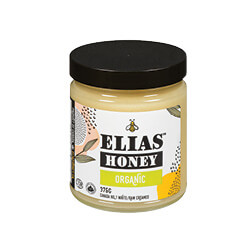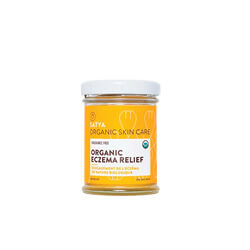Protecting and Enjoying our Precious Pollinators
There’s something magical about happening upon a bee in the garden or in the woods—the way it hover flies and lands on the petal of a lupine flower, clutches the golden pollen and, with that tiny straw mouth, drinks the nectar. With bee survival in peril, will our children’s children know this joyful sight? As World Bee Day nears on May 20, we reflect on what’s keeping bees from thriving, how organic farming is protecting them, and the sweet, soothing ways you can bring home the power of bees.
It was nearly 20 years ago, in 2006, when US beekeepers began to report that worker bees were disappearing, fleeing their nests, queens and even their own larvae seemingly without explanation. Soon, word began to spread about the collapse of colonies and what it would mean to the world if this carried on: without our pollinators, we won’t have plants. Without plants, we risk our air, water, food and medicine— you know, the big things. “Did you hear about the bees?” Neighbours in their gardens, trowels in hand, spoke over fences about the problem. Some American honeybee hives lost 30 to 90 per cent of their colonies. Gone. What did it? The list of threats against the survival of bees is long, and growing. Among the most pressing are climate change, loss of habitat, invasive plants, low genetic diversity, diseases spread by industrial bees, and pesticides. In the year of the vanishing bees, studies now suggest that last threat, pesticides—specifically, the agrochemical neonicotinoids—was likely the major factor that caused bees to flee. Turns out neonicotinoids, a class of insecticides, grow plants with toxic pollen.
Hive-powered Canadian products
Experience the sweetness and wonder of bees and contribute to these makers’ efforts to help protect these precious pollinators.

BEEKEEPER’S NATURALS

ELIAS HONEY

EGYPTIAN MAGIC®

SATYA ECZEMA RELIEF

HONEY CANDLES
Today, there’s so much more awareness about the importance of protecting our pollinators and our health. The European Union has banned the use of neonicotinoids. The Bee Cause project is leading a movement to inspire a generation of environmental stewards. Here in British Columbia, groups are lobbying for more land biodiversity and protected “pollinator pastures”. What we also have going for us are the organic farms that are helping to keep bees alive. The Fruits of the Organic Farmer’s Labour If it were easy, more farms would do it. When organic farmers wake up early to water and weed and harvest in the field, they do it without pesticides, herbicides and some of the government subsidies afforded conventional farmers. Organic farmers are alone against the elements—heat waves, droughts and pests—as they passionately raise those juicy peaches or spears of asparagus. But they do it anyway, because they believe in food security, biodiversity and feeding their communities fruits and vegetables that are as healthy and fresh as they are delicious. That’s good news for us, our pollinators and the earth. Organic practices support bee health in two critical ways: One, it means less exposure to toxic chemicals used in industrial agriculture, especially those neonicotinoid insecticides. Two, because organic producers manage their farms in ways that maintain and improve natural resources, often becoming home to a diverse landscape of flowering plants, more native habitat is protected and biodiversity is preserved. The more plant diversity and sources of sufficient pollen and nectar, the better bees are at contributing to a thriving hive. The Fruits of Bees We take care of the bees, and the bees take care of us. Bees bring us wax and honey, one of nature’s sweetest ingredients. While honey is a tasty addition to toast and tea, it’s also highly beneficial—soothing coughs, healing burns, providing immune-boosting nutrients and more.
